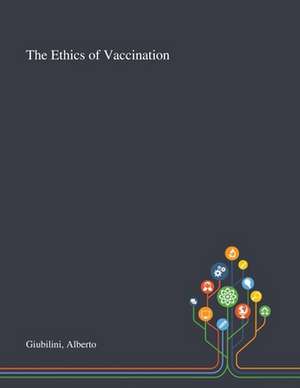The Ethics of Vaccination
Autor Alberto Giubilinien Limba Engleză Paperback – 7 oct 2020
| Toate formatele și edițiile | Preț | Express |
|---|---|---|
| Paperback (1) | 237.57 lei 6-8 săpt. | |
| Saint Philip Street Press – 7 oct 2020 | 237.57 lei 6-8 săpt. | |
| Hardback (2) | 219.74 lei 6-8 săpt. | |
| Springer International Publishing – 10 ian 2019 | 219.74 lei 6-8 săpt. | |
| Saint Philip Street Press – 7 oct 2020 | 320.99 lei 6-8 săpt. |
Preț: 237.57 lei
Preț vechi: 250.08 lei
-5% Nou
Puncte Express: 356
Preț estimativ în valută:
45.46€ • 49.53$ • 38.31£
45.46€ • 49.53$ • 38.31£
Carte tipărită la comandă
Livrare economică 23 aprilie-07 mai
Preluare comenzi: 021 569.72.76
Specificații
ISBN-13: 9781013270406
ISBN-10: 1013270401
Pagini: 136
Dimensiuni: 216 x 280 x 7 mm
Greutate: 0.34 kg
Editura: Saint Philip Street Press
ISBN-10: 1013270401
Pagini: 136
Dimensiuni: 216 x 280 x 7 mm
Greutate: 0.34 kg
Editura: Saint Philip Street Press
Cuprins
Chapter 1: Vaccination: Facts, Relevant Concepts, and Ethical Challenges.- Chapter 2: Vaccination and Herd Immunity: Individual, Collective, and Institutional Responsibilities.- Chapter 3: Vaccination Policy and the Principle of Least Restrictive Alternative: an Intervention Ladder.- Chapter 4: Fairness, Compulsory Vaccination, and Conscientious Objection.
Recenzii
“The Ethics of Vaccination is a carefully researched and convincing project. … Giublilini is generally successful in providing an accessible knowledge base. … Giubilini’s thought-provoking plea for collective, institutional, and individual obligations to reach high vaccination rates serves as a powerful and timely voice of support for intergenerational justice.” (Marius Kunte, Intergenerational Justice Review, Vol. 7 (1), 2021)
“The author explores the ethical considerations around individual, collective, and institutional responsibilities to provide for herd immunity. He evaluates a ranking of vaccination policies from the least restrictive to the most coercive … . A worthy addition to health policy and medical ethics collections.” (R. L. Jones, Choice, Vol. 56 (10), June, 2019)
“The author explores the ethical considerations around individual, collective, and institutional responsibilities to provide for herd immunity. He evaluates a ranking of vaccination policies from the least restrictive to the most coercive … . A worthy addition to health policy and medical ethics collections.” (R. L. Jones, Choice, Vol. 56 (10), June, 2019)
Notă biografică
Alberto Giubilini, Ph.D., is a Research Fellow at Oxford Martin School and Wellcome Centre for Ethics and Humanities, University of Oxford, UK. He holds a Ph.D. in Philosophy from the University of Milan, Italy, and has held previous appointments at Monash University, University of Melbourne and Charles Sturt University, all in Australia, working on different topics in bioethics and philosophy more generally.
Textul de pe ultima copertă
This open access book discusses individual, collective, and institutional responsibilities with regard to vaccination from the perspective of philosophy and public health ethics. It addresses the issue of what it means for a collective to be morally responsible for the realisation of herd immunity and what the implications of collective responsibility are for individual and institutional responsibilities.
The first chapter introduces some key concepts in the vaccination debate, such as ‘herd immunity’, ‘public goods’, and ‘vaccine refusal’; and explains why failure to vaccinate raises certain ethical issues. The second chapter analyses, from a philosophical perspective, the relationship between individual, collective, and institutional responsibilities with regard to the realisation of herd immunity. The third chapter is about the principle of least restrictive alternative in public health ethics and its implications for vaccination policies. Finally, the fourth chapter presents an ethical argument for unqualified compulsory vaccination, i.e. for compulsory vaccination that does not allow for any conscientious objection.
The book would appeal both philosophers interested in public health ethics and the general public interested in the philosophical underpinning of different arguments about our moral obligations with regard to vaccination.
The first chapter introduces some key concepts in the vaccination debate, such as ‘herd immunity’, ‘public goods’, and ‘vaccine refusal’; and explains why failure to vaccinate raises certain ethical issues. The second chapter analyses, from a philosophical perspective, the relationship between individual, collective, and institutional responsibilities with regard to the realisation of herd immunity. The third chapter is about the principle of least restrictive alternative in public health ethics and its implications for vaccination policies. Finally, the fourth chapter presents an ethical argument for unqualified compulsory vaccination, i.e. for compulsory vaccination that does not allow for any conscientious objection.
The book would appeal both philosophers interested in public health ethics and the general public interested in the philosophical underpinning of different arguments about our moral obligations with regard to vaccination.
Caracteristici
Comprehensively discusses the individual, collective, and institutional responsibility for vaccination and herd immunity Offers a philosophical analysis of the ethical issues that vaccination and vaccination policy raise in terms of moral responsibility Clarifies what individuals, collectives, and citizens may and should do in order to achieve herd immunity from vaccine preventable infectious diseases
